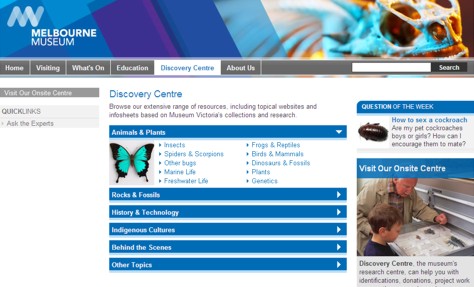Michael Wesch has written a brilliant article called ‘A vision of students today (and what teachers must do)’ which is featured on the Britannica blog. Wesch talks about how he asked his students how many of them did not like school. Over half of them raised their hands. When he asked how many of them did not like learning, no hands were raised. Wesch gives an interesting example of a similar irony in the acceptance speech of last year’s US Professor of the Year, Chris Sorensen, which began:
Life’s ironies! Here I am, being honored as professor of the year for the entire United States, and the truth is… I hate school!
Professor Sorensen claims to have daydreamed his way through school, filling his time of disengagement with the workings of his fertile mind – things like imagined expeditions based on maps in his history book, and relishing the bound treasures in his school library. I’m not sure if today’s students would regard books with such awe and enthusiasm. Would they have a similar regard for the possibilities of the internet? That’s an interesting question. Is it the fact that Sorensen was gifted that, if allowed the freedom, he would organize his own learning, muster his own enthusiasm, maintain his own self-discipline?
Nevertheless, the point about disengagement of students is one with which most educators would not argue. Wesch entertains the idea of ‘play’ as opposed to dull routine and meaningless tasks.
Perhaps the word “play” is imperfect. I could say that in school, they should be invigorated or engaged or even inspired. But whatever the word, the idea is to create a stimulating environment were the learning comes natural and not forced, where the desire to learn is created first. Then, the labor of learning is a labor of love.
Technology is what students of today play with. As many advocators of 21st century learning suggest, technology plays a large part in the new vision of education. But technology is also the thorn in the side of a large number of teachers. Although we use the language – ‘integration of technology into learning’ – not many of us have actually taken this seriously. Managing technology in the classroom is often seen as asking for more problems. Wesch is clear about the role of technology in his classroom:
Texting, web-surfing, and iPods are just new versions of passing notes in class, reading novels under the desk, and surreptitiously listening to Walkmans. They are not the problem. They are just the new forms in which we see it. Fortunately, they allow us to see the problem in a new way, and more clearly than ever, if we are willing to pay attention to what they are really saying.
What are they saying? I think they’re saying that they’re bored, that their tasks are not relevant, that their projects are not engaging, that they’re sick of being passive recipients of content over which they have no control. When they turn to texting or web-surfing, they’re getting out of the classroom, they’re reaching out into the world.
Wesch explains this problem:
And that’s what has been wrong all along. Some time ago we started taking our walls too seriously – not just the walls of our classrooms, but also the metaphorical walls that we have constructed around our “subjects,” “disciplines,” and “courses.”
When I was in primary school, I had a strong sense of where I belonged. I belonged only with kids who were born within 12 months of my birthday. I was afraid of those a year ahead of me who belonged to an entirely differentand superior group, one that I wasn’t to have anything to do with. If I had known what learning took place in the older years, I would have wanted to be there, but I learned to sit and wait during reading classes, as students took turns to labour over stories in our reader, stories I had already read early in the year. There was no wider reading, there was no skipping ahead, we all had to be open to the same page, doing nothing but daydreaming. The reader was all we had for the entire year. And so would the next class the following year. Of course, now things have changed a great deal. Now we have many more reading choices, and in some cases primary students can choose to read library books instead of readers from the box.
But I’m not sure that things have changed as much as we think. We still teach from textbooks. We’re not all consistently planning scaffolded inquiry-based projects which ask rich questions. We’re not experimenting enough ourselves with technological applications and seeing educational possibilities. We’re still proud of research assignments that supposedly encourage independent learning, assignments which leave our students to google incompetently, to copy and paste, to present superficial findings, to lose interest, to just get the thing done, hand it in and sigh with relief.
Wesch is clear about the solution:
Fortunately, the solution is simple. We don’t have to tear the walls down. We just have to stop pretending that the walls separate us from the world, and begin working with students in the pursuit of answers to real and relevant questions.
He says we need to acknowledge the shift in learning based on information being everywhere. What we should do is let go of ‘the sage on the stage’.
When we do that we can stop denying the fact that we are enveloped in a cloud of ubiquitous digital information where the nature and dynamics of knowledge have shifted. In the process, we allow students to develop much-needed skills in navigating and harnessing this new media environment, including the wisdom to know when to turn it off. When students are engaged in projects that are meaningful and important to them, and that make them feel meaningful and important, they will enthusiastically turn off their cellphones and laptops to grapple with the most difficult texts and take on the most rigorous tasks.
Something is not right in the state of education. Wesch, to finish off:
And there’s the rub. We love learning. We hate school. What’s worse is that many of us hate school because we love learning.
It doesn’t have to be this way…







